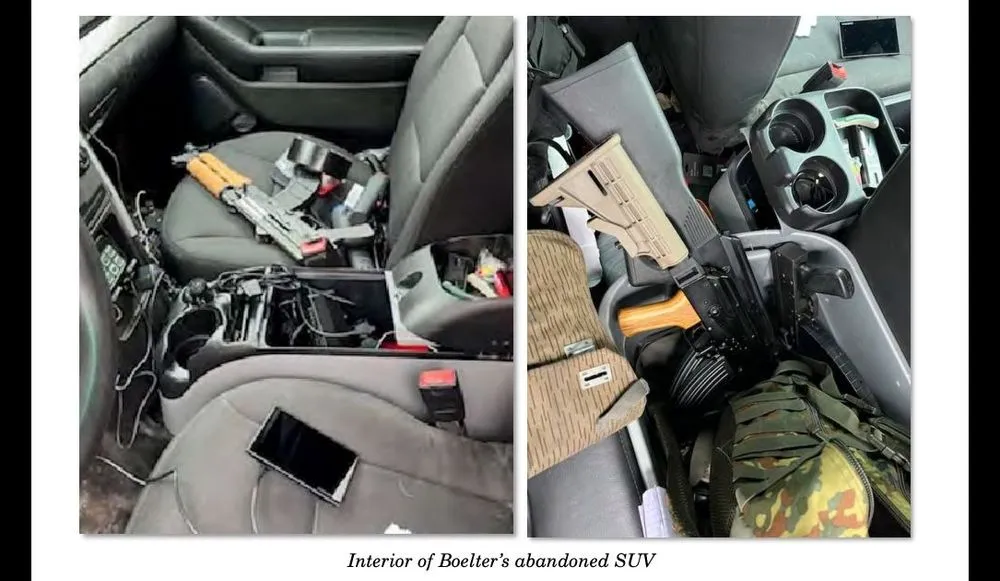Minnesota lawmaker’s alleged killer had list of data broker websites in car, FBI says
Police found a list of 11 data brokers in an SUV driven by the man who allegedly murdered a Minnesota state representative and her husband Saturday, court documents show.
The list naming the data brokers includes notations about which sites are free to use and how much information they require to obtain detailed data about individuals being searched, according to an FBI affidavit filed Monday in Minnesota.
Notebooks in the SUV contained the names of more than 45 Minnesota state and federal officials, including state Rep. Melissa Hortman, who was slain alongside her husband, the affidavit said.
Hortman’s address was listed next to her name, the affidavit said. Notes belonging to the alleged killer, Vance Boelter, also included Hortman’s husband’s first name.
Data broker websites provide information not only on individuals, but also on their family members.
“Most property records in America are public,” the notes said, according to the affidavit.
Data brokers collect a great deal of data on individuals — including their names, home addresses, phone numbers and relatives’ names and home addresses — and publish it online. They typically require users to pay for the information, but anyone buying the data can do so without being vetted.
Boelter is also accused of shooting an additional Minnesota state lawmaker and his wife at their home. That lawmaker and his spouse survived.
“Evidence uncovered in this investigation indicates that Boelter extensively planned his stalking, murders, and attempted murders,” the affidavit says. “Boelter's preparation efforts included identifying several websites that allow users to search for the personal information of others, like home addresses and family member names.”
The notebook found in Boelter’s car is the first time such strong evidence tying a data broker to the murder of a public official has been recovered, experts said.
“This new case is unique in that the evidence that [the alleged killer] used data brokers is overwhelming," said data broker expert Jeff Jockisch, managing partner at ObscureIQ, which provides digital executive protection. “Data brokers get people killed every day — the problem is that cops just don’t look for that as a methodology.”
The federal government and most state governments do not require data brokers to allow law enforcement and other people working in sensitive fields — such as elected officials — to force the companies to take information down.
A Vermont state representative who drafted such legislation said the Minnesota tragedy will give momentum to other state and federal lawmakers seeking to rein in data brokers.
“It is helpful for attempting to regulate the data broker industry that there's such clear evidence that [data broker sites] are what the killer used,” said State. Rep. Monique Priestley, who drafted the Vermont legislation, which passed the state House but was tabled in the Senate.
Priestley said a lawmaker texted her Monday asking for the legislation’s language and requesting an update on its status. The bill is based on requirements in New Jersey known as “Daniel’s Law.”
“I don't think that's going to be the last text I get,” Priestley said.
Politico first reported that that the FBI found the list of data brokers.
Sen. Amy Klobuchar (D-MN) was reportedly among the Minnesota lawmakers Boelter listed as a target.
In 2023, Klobuchar and Texas Sen. Ted Cruz proposed legislation that sought to give lawmakers the ability to stop data brokers from selling their information online. That bill did not pass.
Sen. Ron Wyden (D-OR), a legislator known for his focus on privacy, said in a statement that Congress “doesn't need any more proof that people are being killed based on data for sale to anyone with a credit card. Every single American's safety is at risk until Congress cracks down on this sleazy industry."
Correction: A previous version of this story misidentified Vermont State Representative Monique Priestley as a State Senator.
Suzanne Smalley
is a reporter covering digital privacy, surveillance technologies and cybersecurity policy for The Record. She was previously a cybersecurity reporter at CyberScoop. Earlier in her career Suzanne covered the Boston Police Department for the Boston Globe and two presidential campaign cycles for Newsweek. She lives in Washington with her husband and three children.



